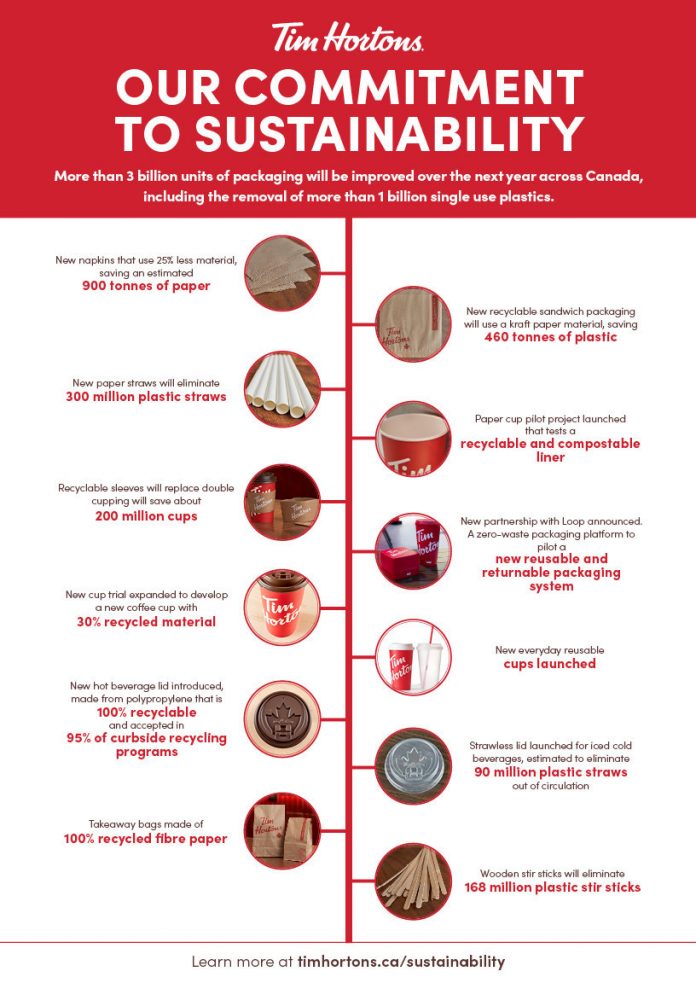
To cap off a series of important announcements during Waste Reduction Week, Tim Hortons is proud to share that more than three billion units of packaging will be improved over the next year across Canada, including the removal of more than one billion single-use plastics.
Every day this week, Tim Hortons unveiled a new initiative to improve its environmental impact, guided by the simple principle of doing what’s right.
“We’ve shared a lot of progress this week that we’re incredibly proud of but there’s a lot more to come,” said Paul Yang, Lead, Innovation & Sustainability for Tim Hortons.
“From our trial of a hot beverage cup with a liner that’s recyclable and compostable, to our first-of-its-kind-in-Canada partnership with Loop on cups and food containers that are reusable and returnable, we will continue to innovate, evolve and further our agenda to shape a more sustainable future. Canadians can expect to hear a lot more about our progress going into 2021 and beyond.”
Other sustainability initiatives Tim Hortons announced during this week’s Waste Reduction Week include:
Monday: Significant improvements have been made to paper napkins, which guests will see in restaurants in early 2021. The new napkins are made with 100 per cent recycled fibre and use 25 per cent less material. The change to the new napkins is expected to save 900 tonnes of paper each year.
Tuesday: Tim Hortons is taking another significant step toward cutting its use of plastics by preparing to rollout new paper-based wrappers for sandwiches and bagels that are fully recyclable, while also cutting the use of paper by 17 per cent annually. The new packaging, expected to be in restaurants in January, is estimated to reduce more than 460 tonnes of plastic over the next year. Tim Hortons also recently announced the shift to paper straws, which is estimated to eliminate the use of about 300 million plastic straws over the next year.
Wednesday: On Nov. 4, Tim Hortons restaurants in Canada will stop the practice of double-cupping and will instead be offering guests a recyclable cardboard sleeve for their hot drinks.
The move is expected to eliminate the unnecessary use of more than 200 million cups per year – or the equivalent of wrapping half the circumference of the planet with Tim Hortons cups. Tim Hortons cardboard coffee sleeves are manufactured from 100 per cent recycled material and are 100 per cent recyclable.
Thursday: Tim Hortons is excited to be partnering with TerraCycle’s zero-waste platform, Loop, to pilot a program that will give guests the option of paying a deposit and receiving reusable and returnable cups or food containers with their order so they can help us on our mission to reduce single-use waste. When guests are finished their drink or meal, they can return their reusable cups or food containers at a participating restaurant and have their deposit refunded. The reusable cups and food containers are then professionally cleaned and sanitized by Loop so they can be reused again and again. It’s anticipated that over time, the Loop platform would have a growing number of drop-off locations — both at Tim Hortons restaurants and elsewhere — that would make the program even more convenient for guests to participate in. The pilot test is expected to start in 2021 at select Toronto restaurants.
“It was impressive to follow the important announcements made by Tim Hortons over the course of Waste Reduction Week. Their commitment to innovating and evolving their packaging, as well the push towards a reusable future, is at the forefront of the industry. Canadians are looking to organizations to adapt their practices with sustainability in mind and it’s clear Tim Hortons is serious about being a leader,” said James Downham, President and CEO, PAC Packaging Consortium.
Learn more about these initiatives and more at https://www.timhortons.ca/sustainability.







